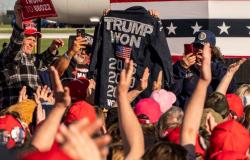Thursday’s argument in Trump v. United States was a disaster for Special Counsel Jack Smith, and for anyone who believes that the president of the United States should be subject to prosecution if they commit a crime.
At least five of the Court’s Republicans seemed eager to, at the very least, permit Trump to delay his federal criminal trial for attempting to steal the 2020 election until after this November’s election. And the one GOP appointee who seemed to hedge the most, Chief Justice John Roberts, also seemed to think that Trump enjoys at least some immunity from criminal prosecution.
Much of the Court’s Republican majority, moreover, seemed eager not simply to delay Trump’s trial until after the election, but to give him extraordinarily broad immunity from criminal prosecution should he be elected once again. Justice Brett Kavanaugh, for example, argued that when a president exercises his official powers, he cannot be charged under any federal criminal statute at all, unless that statute contains explicit language saying that it applies to the president.
As Michael Dreeben, the lawyer arguing on behalf of Smith’s prosecution team, told the Court, only two federal laws meet this standard. So Kavanaugh’s rule would amount to near complete immunity for anything a president did while exercising their executive authority.
Justice Samuel Alito, meanwhile, played his traditional role as the Court’s most dyspeptic advocate for whatever position the Republican Party prefers. At one point, Alito even argued that permitting Trump to be prosecuted for attempting to overthrow the 2020 presidential election would “lead us into a cycle that destabilizes … our democracy,” because future presidents who lose elections would mimic Trump’s criminal behavior in order to remain in office and avoid being prosecuted by their successor.
In fairness, not all of the justices, or even all of the Republican justices, engaged in such dizzying feats of reverse logic. Roberts did express some concern that Trump lawyer John Sauer’s arguments could prevent the president from being prosecuted if he took a bribe.
Justice Amy Coney Barrett, meanwhile, pointed to the fact that Sauer drew a distinction between prosecuting a president for “official” behavior (which Sauer said is not allowed), and prosecuting a president for his “private” conduct (which Sauer conceded is permitted ). Barrett also argued that many of the charges against Trump, such as his work with private lawyers and political consultants to overthrow the 2020 election, qualify as private conduct and thus could still be prosecuted.
Still, many of the Republican justices, including Barrett, indicated that the case would have to be returned to the trial court to determine which of the allegations against Trump qualify as “official” and which qualify as “private.” Barrett also indicated that Trump could then appeal the trial court’s ruling, meaning that his actual criminal trial would be delayed for many more months as that issue makes its way through the appeals courts.
In that world, the likelihood that Trump will be tried, and a verdict reached, before the November election is approximately zero percent.
The Court’s decision in the Trump case, in other words, is likely to raise the stakes of this already impossibly high-stakes election considerably. As Justice Ketanji Brown Jackson warned, the risk inherent in giving presidents immunity from the criminal law is that someone like Trump “would be emboldened to commit crimes with abandon.”
It’s unclear if the Court is going to go so far as to definitively rule that the president of the United States is allowed to commit crimes. But they appear likely to make it impossible for the criminal justice system to actually do anything about Trump’s attempt to overthrow the election — at least before Trump could be elected president again.
Even if Trump technically “loses” this case, he’s still won
Under current law, all government officials enjoy some immunity from civil lawsuits. The president, meanwhile, is on a short list of government officials, alongside judges and prosecutors, who enjoy particularly robust immunity from such suits. But the law has never been understood to immunize any government official from criminal prosecution.
Moreover, while no president has been prosecuted prior to Trump, judges and prosecutors (who enjoy the same level of immunity from civil suits as the president) are routinely prosecuted for taking bribes or for otherwise violating the criminal law during their official conduct in office.
For this reason, I’ve argued that his immunity case was primarily about delaying Trump’s trial until after the election. The arguments for presidential immunity from the criminal law are so weak and their implications are so shocking — Trump’s lawyer told a lower court that unless Trump had first been successfully impeached, he could not be prosecuted even if he ordered the military to assassinate one of his political rivals — that it seemed unimaginable that even this Supreme Court would buy Trump’s immunity arguments.
After Thursday morning, however, a decision that merely delays Trump’s criminal trial until after the election is probably the best possible outcome Smith could hope for. There appears to be a very real chance that five justices will rule that the president of the United States may use his official powers in order to commit very serious crimes.
Even the best case scenario for Smith, moreover, is still an enormous victory for Donald Trump. If Trump prevails in the 2024 election, he can order the Justice Department to drop the charges against him or even potentially pardon himself. And, regardless of what happens in November, the American people will go to the polls without the clarity of a criminal trial which determines whether or not Trump is guilty of attempting to drive a knife into US democracy.
The case is likely to turn on the difference between “official” and “private” behavior
Trump’s core argument is that the president is immune from prosecution for “official acts” taken while he was in office. All six of the Court’s Republicans showed at least some sympathy for this argument, although some displayed more sympathy than others.
It appears likely that at least four justices — Justices Clarence Thomas, Alito, Kavanaugh, and Neil Gorsuch — will give Trump the immunity he seeks (or apply a rule like Kavanaugh’s requirement that criminal statutes don’t apply to the president unless they explicitly say so, which would have virtually the same effect). At one point, Thomas even suggested that the Justice Department’s decision to appoint Smith to investigate Trump was unconstitutional.
Roberts and Barrett, meanwhile, were a little more enigmatic. But both, at the very least, floated sending this case back down to the lower court for more delay.
Chief Justice Roberts, for what it’s worth, did express some concern that the line between an “official” action and a “private” one is difficult to draw. Early in the oral argument, he asked Sauer about a president who appoints someone as an ambassador because that appointee gave the president a bribe.
While making the appointment is an official act, taking a bribe is not. Roberts worried that prosecutors would be unable to secure a bribery conviction if they were forbidden from telling the jury about the official act taken by the president in order to secure that bribe.
Barrett, meanwhile, spent a considerable amount of time walking Sauer through the actual allegations in the indictment against Trump. And she even got him to admit that some of the charges, such as consulting with private lawyers and a private political consultant on how to certify fake electors, amount to private conduct that could be prosecuted.
Later in the argument, however, Barrett seemed to lay out how the process of determining which parts of the indictment can survive should play out. Under her suggested framework, the trial court would have to go through the indictment and sort the “official” from the “private.” The trial would then be put on hold while Trump appeals whatever the trial court says to higher courts — in a process that is likely to take months or even longer to sort out.
By the time that was all done, the November election would be long past, and Trump could very well be back in office — and emboldened to commit more crimes in the very way that Justice Jackson warned about.
Indeed, the striking thing about Thursday’s argument is that most of the Republican justices appeared so overwhelmed by concern that a future president might be hampered by fears of being prosecuted once they leave office, that they completely ignored the risk that an un-prosecutionable president might behave like a tyrant. Gorsuch even warned that presidents might “try to pardon themselves” on the way out the door to avoid such prosecutions.
Under the legal rule that Gorsuch and many of his colleagues are considering, however, such a pardon would be unnecessary because the president would be almost entirely above the law — including, potentially, a president like Trump, who has already shown his eagerness to destroy constitutional governance for his own personal gain.
Yes, I’ll give $5/month
Yes, I’ll give $5/month
We accept credit card, Apple Pay, etc
Google Pay. You can also contribute via






